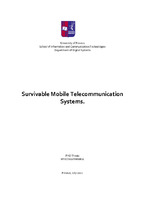Survivable mobile telecommunication systems

Doctoral Thesis
Συγγραφέας
Μυκονιάτη, Μαρία
Mykoniati, Maria
Ημερομηνία
2022-07Προβολή/
Λέξεις κλειδιά
Survivable systems ; Information security ; Business continuity ; Telecomunication systemsΠερίληψη
Επιβιώσιμα συστήματα είναι αυτά που έχουν την ικανότητα να διατηρούν τις υπηρεσίες τους λειτουργικές κατά την διάρκεια καταστροφών, αστοχιών, επιθέσεων κλπ. Ο βασικός στόχος αυτών των συστημάτων είναι η αντίσταση στην αποτυχία του
συστήματος να παρέχει τις κρίσιμες υπηρεσίες του. Η παρούσα διατριβή περιγράφει αρχικά την έρευνα γύρω από τον ορισμό της επιβιωσιμότητας και των βασικών χαρακτηριστικών ενός επιβιώσιμου συστήματος. Στη συνέχεια, η έρευνα συνεχίζεται με τον καθορισμό των ιδιοτήτων που κάνουν ένα δίκτυο κινητής τηλεφωνίας επιβιώσιμο, έτσι όπως αυτές ορίζονται από το 3GPP Standard, και τη βιβλιογραφία. Δύο σημαντικές ελλείψεις σχετικά με τα χαρακτηριστικά ενός επιβιώσιμου συστήματος εντοπίζονται, και αναπτύσσονται δύο μεθοδολογίες που καλύπτουν αυτές τις ελλείψεις και ορίζονται ως απαραίτητες προϋποθέσεις που θα πρέπει να ληφθούν υπόψιν κατά την ανάπτυξη τέτοιων συστημάτων. Στη συνέχεια, η έρευνα ολοκληρώνεται με την ανάπτυξη της ζητούμενης μεθοδολογίας (SDLC) για την κατασκευή επιβιώσιμων δικτύων κινητής τηλεφωνίας. Η εφαρμογή της μεθοδολογίας γίνεται στη μελέτη περίπτωσης δικτύων 4ης γενιάς (4G LTE Networks)
ώστε να διερευνηθεί η αποτελεσματικότητα της σε σχέση με την προϋπάρχουσα μεθοδολογία που ακολουθείται από τις εταιρίες ανάπτυξης συσκευών δικτύων κινητής τηλεφωνίας. Τέλος μία ποσοτική και ποιοτική ανάλυση των αποτελεσμάτων παρουσιάζεται ώστε να φανούν τα αποτελέσματα της απόδοσης της προτεινόμενης μεθοδολογίας.

